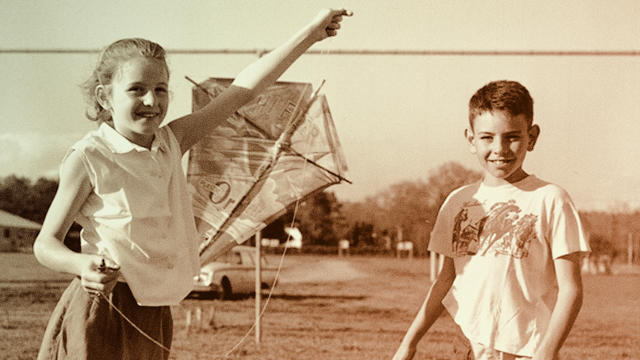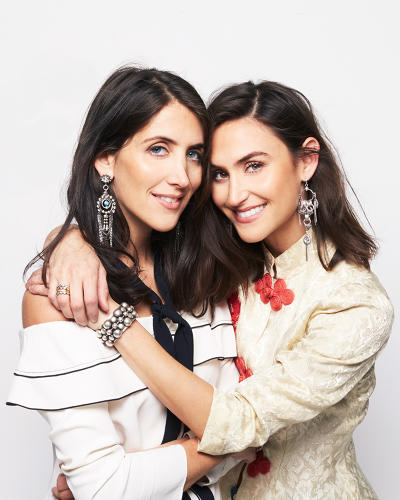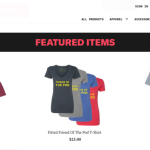How To Kill It In Business With Your Sibling Without Killing Each Other
For the Drybar cofounders Alli Webb and Michael Landau, who are also sister and brother, going into business together for the first time wasn’t as easy as they expected.
“We were both working for Nicole Miller, and we actually got the franchise rights to open stores in Boca Raton and Miami,” Landau told Fast Company. “And we nearly killed each other.”
If, like me, you can’t fathom the idea of working harmoniously with your sibling, this might sound like a cautionary tale. Alli and Michael thought the same and went their separate ways. But over a decade later, after finding success with an at-home blowout service, Alli approached Michael with a pitch for a hair salon that trafficked exclusively in blowouts. Once she got Michael on board (“What? You want to open a blow-drying place?”), the siblings decided to chance it and make another go of it, perhaps against their better judgment.
“When we told our parents that we were going into business together again, they literally freaked out,” Landau said. “But Alli and I, we had both matured. I realized the mistakes I had made. We both realized what buttons we couldn’t push and what lines we couldn’t cross in terms of a partnership.”
Seven years later, Drybar has raised $71 million in funding, boasts upwards of 3,000 employees, and operates more than 60 stores nationwide (with another 15-20 locations in the works). But keeping things in the family doesn’t guarantee a favorable outcome in business, as the brothers and cofounders behind Gravity Payments can surely attest to. So how do you build a thriving, sibling-led business—and what does it take to forge a professional working relationship from an entrenched sibling dynamic? Here’s what I learned from Alli and Michael, and other sibling duos who started their own companies.
Divide And Conquer
One recurring theme among the founders I spoke to was that choosing to go into business with a sibling involved—and sometimes stemmed from—recognizing how their professional backgrounds or personalities diverged. When Alli asked Michael to help her open the first Drybar salon, she understood the value of what he could bring to the table, with his background in management and experience starting businesses.
“More than anything, we have, had, and will always have very different skill sets,” Alli said. “Michael is really good at the business side of things and a lot of things that I’m just not. And he didn’t understand the hair business and the salon industry, so I had to teach him about that. It was great coming together—being very respectful of the other’s strengths.”
“She kind of defers to me when it comes to business, and I defer to her when it comes to the creative and the hair side of it,” Michael said. “Not to say we don’t each have opinions on the other and it’s been really important that I’m not cavalier about business decisions and don’t include her. We like to joke that I know way more than any straight guy should about hair.”
As with Drybar, online invitation startup Paperless Post came to fruition when CEO James Hirschfeld turned to his sister Alexa with an idea. The two had long wanted to work together, and James felt Alexa possessed certain qualities that he lacked.
“Communication and inspiring people is actually quite difficult for me; it takes a ton of energy out of me and is something I can only do with people I’m very comfortable with. But Alexa is an incredibly charismatic and intuitive communicator and leader. I was able to make her see this vision I had, and then work with her to build a team and inspire the people who actually built the product in the beginning to work with us, even though we were first-time entrepreneurs with very little money and no product or tech background.”
Alexander Tibbets says the decision to help his brother Linden build IFTTT—the popular productivity tool that enables apps to talk to each other—was less deliberate. But much like other sibling cofounders, Alex served as a foil to Linden in terms of the roles he took on at the company.
“When we started off, I was on programming and design, and Alex was on community and support,” Linden said. “As we started to grow the business and hire other people, it became operations and marketing and business development. Pretty much everything that wasn’t product and design, Alex was handling. I stepped into the CEO role. Alex continued to wear lots and lots of different hats over time.”
This divvying up of power, so to speak, is arguably more important when the siblings in question are the same sex.
“One of the things that is both an advantage and a disadvantage is that [same-sex] siblings, whether they’re brother-brother or sister-sister—they’re naturally more competitive than when they’re a brother and sister,” Linden said. “We come from a family of three brothers, so we’re incredibly competitive. I think in many ways, that’s awesome. That kind of pushes us—pushes the business. What’s competition if not a startup? But if you let some of that competitiveness seep into your conversations in ways that are not positive, it can be really damaging.”
“I think you take a lot of the competition out of the situation when you’re different genders and you can appreciate each other,” James said of his working relationship with Alexa. “We have a brother, and I would have found it very difficult to do the same thing with him.”
Choosing someone to be the public face of the company, for example, can be a more fraught decision with same-sex siblings. But for the Tibbets brothers, there was never much hand wringing over who would act as the “face” of IFTTT and field interviews and press—perhaps, in part, because Linden was the one with a technical background.
“It was really easy to let Linden soak up all the face time in front of the camera,” Alex said. “I was always way more comfortable behind the scenes, behind the camera, so it was actually excellent that Linden has not only wanted to, but has taken on being the face of the company in his role as CEO.”

When Open Communication Is Too Open
The initial decision to work with a sibling is not all that different from the decision to start a company with anyone else: You want to choose someone whose skill set compliments yours and whose vision for the company aligns with yours. The part where things get trickier is how you communicate once the work begins, in front of employees and management. Siblings can’t simply transplant their existing dynamic into the workplace without making some adjustments.
“Even behind closed doors, the type of fights we can have, or arguments, are faster and more productive—and also more animated,” James said. “If I had those type of fights with anyone else I worked with, they would be scarring.”
“There’s so much history there, with being sisters,” Danielle Snyder, who started the Beyoncé-approved jewelry company Dannijo with her sister Jodie, told Fast Company. “It’s the good and the bad. In some ways, it’s beautiful because you can finish each other’s sentences—you leave a business meeting and know exactly what the other is thinking. You’re almost telepathic. But on the other hand, it can be much more emotional, and you’re much more sensitive when it comes to how your sister and your best friend and your business partner addresses something.”
For most people, the relationship they have with a sibling is the longest they will ever have: You grow up together and will know a sibling longer than you do your parents, partner, or children. With that level of closeness comes both an intimate understanding of what makes your sibling tick—and how to get under their skin.
That’s exactly why sibling relationships can be intense and complicated. Psychologists and professors who have studied this note that the dynamic that exists between siblings when they’re younger often does not change much over the years. The emotional baggage you might carry if you feel like your parents favored your sibling growing up, for example, can hang over your relationship even as adults.
So for the people looking in, the sibling relationship can seem impenetrable and a risky thing to bet on.
“One of the disadvantages of working with a sibling is it’s a hard dynamic for people on the outside to peer into,” James said. “And I mean that on the level of, they might not understand the dynamic when we fight, and that we’re fighting because that’s a way of communicating. We’re arguing. And we don’t need to wear kid gloves. Also, when you think about other people on our management team, or people who are looking at the company as a place to grow their career, we’ve really made an effort to communicate that we’re not some sort of a cabal.”
When Michael was shopping around for investors, he found that many were hesitant to bankroll a startup helmed by a brother-sister duo. He sometimes found that people interviewing for senior executive roles had similar concerns. “As we have grown and raised money from institutional investors and big private equity firms, and also hired a professional CEO, there’s always that reluctance because everybody has a war story about how family businesses have imploded,” Michael said. “I can definitely tell you that I’ve had numerous conversations over the years getting people comfortable.”
It is, of course, inevitable that siblings will fight or get into heated arguments, even—perhaps especially—in a work setting. At Drybar, CEO John Heffner sometimes acts as a buffer between Alli and Michael.
“Michael and I have had our, like, five really bad fights,” Alli said. “Sometimes it’s like—it’s your brother. Your stupid brother. I get really mad at him, and I can’t control it. I got really mad at him one day and we got into a really big, loud fight . . . [our CEO] John came into our office and was like, ‘You guys, get it together, you can’t fight right now!'”
“Listen, both Alli and I—I’m sure it doesn’t surprise you—we’re both a little assertive and we both have strong opinions,” Michael said. “One of the many awesome things about our CEO is that he can and has often played mediator between the two of us.”
But not every company has an effective middleman. The IFTTT brothers opted to use code words, at least initially, to pull themselves out of unproductive bickering and stay on track.
“If things started to get out of hand, and it was clear that we were now arguing with each other rather than trying to address the path forward or make the right decision, one of us would say, ‘You know, I’m just trying to build something great here,'” Linden said. “That was a thing you could say in front of other people. It was kind of a trigger word that would tell the person, ‘Hey, we’re starting to get off track, we need to bring it back.” We only ended up having to use it probably 10-15 times total before we both kind of quickly forgot it.”
For sibling cofounders who are also CEOs, the role is doubly complicated because they may be tasked with not only dictating their work but also evaluating their sibling’s performance. It can be difficult not to take negative feedback personally if it’s coming from a sibling.
“When I get feedback for Alexa—I’m her manager, I’m doing her reviews right now—I give it to her directly,” James said. “That’s where you become a professional and not a sibling. And you have to realize that you have been hired for a job. It’s your career.”
“We had to make a clear distinction between what was personal and what was in the realm of the brother, and what was professional and in the realm of us trying to build this business,” Linden said. “It’s that line you constantly have to adjust and reconfirm and make sure we’re on the same page. If you don’t set that line early on, you’re pretty much setting yourself up for a nightmare. Imagine doing the sibling performance review and not having that line.”
Some of these challenges aren’t unique to sibling cofounders. (Surely a performance review is also uncomfortable for cofounders who are friends.) Though being siblings may keep a business together for longer, it certainly doesn’t secure the success of a business if there is little compatibility between the people in charge.
“Being siblings is not enough to be good business partners. But if you work well together, being siblings can make it that much better,” James said.
Trust Is Key
The greatest boon of working with a sibling may be the implicit trust that is already baked into your relationship. In business, this can be invaluable, according to Michael. “The ability to bring on a business partner who isn’t on the creative side is a tough thing for some entrepreneurs, and I imagine it’s because you really have to trust somebody to hand off the business side of things because that’s the money,” he said.
“One day James is working really hard and I’m exhausted, physically or emotionally,” Alexa said. “And the opposite happens, too. But you trust that the person has your back. And when they go into a room to sign a paper for fundraising or whatever, it’s like you signing that paper.”
That faith also helps move disagreements along: More often than not, one sibling will acquiesce to the other, according to Michael and Alli.
“This is such a silly thing, but when we were first developing the concept for Drybar, Michael didn’t want us to have the hairstyles named after drinks,” Alli said. “He thought it was kind of cheesy. And I was like no, it’s such a good idea! It wasn’t a big fight, but it was just one of those things, where he said okay, you think it’s a good idea because it was more in my wheelhouse than his.”
“Jodie and I handle things differently—we’re a bit of a yin and yang,” Danielle said. “There’s definitely been times where, with or without the team, whether it was in a business meeting or in an internal meeting, where one of us said, ‘Well, I would have handled it differently.’ After eight years, you learn how to respect the other even though you might see something differently. So absolutely there’s been times where there was some tension, but nothing that wasn’t solved within 10 minutes.”
Every cofounder I spoke to stressed the importance of candor, which can take time to cultivate in a regular business partnership. A sibling might be the only person, aside from a parent or maybe spouse, with whom you are completely transparent.
“We’re never passive aggressive,” Jodie said. “There’s never things that you don’t say to the other person. For us, we have the same goals in business, but I think if it’s not your sibling, sometimes people dance around issues or wait until things get too big to deal with them.” Danielle added that it’s just a “more efficient relationship.”
For someone like Alli, who does not have a business background, Michael has been a translator of sorts who fields questions that she “couldn’t ask anybody else.”
“For the first couple years, I kind of felt intimidated and really relied on Michael,” Alli said. “I would ask Michael a question to ask everybody else because I was afraid I would sound silly or something . . . I can lean on Michael and feel really safe to ask him something that I might not be comfortable asking a big room full of people, and know that I’m not going to be judged and that he’ll explain it to me.”
“We’ve been in many board meetings where Alli sent me a text—where she’s been nodding at what everyone’s saying—and she’s like, ‘You’re going to have to explain this to me later,'” Michael said.
Something that should embolden investors is that siblings automatically have a more vested interest in the success of their partnership. There’s more at stake: A cofounder is far less likely to leave a business if it would mean disappointing their sibling or damaging the relationship.
“There have been times when for personal reasons, it would have been nice to, say, move to another country,” James said. “We’ve both been doing this for a long time. If there were a different relationship between us, I think there would have been a million opportunities along the way for one of us to give up on the other, or say, ‘I’ve got to think about myself here.’ Obviously we have free will, but you’re really considering a partnership that’s more fundamental. When we looked our first investor in the eyes as a 21- and 23-year-old—when we had never proven ourselves—and asked for a really big check, I think he probably thought that we weren’t going to dump each other.”
Michael says there’s no comparison between his experience working with Alli at Drybar and previous partnerships he has forged. “I’ve had lots of other business partners and really great relationships, but there’s a difference between how you trust a business partner, no matter how close you are, versus how you trust your sister or your brother. She knows at the end of the day there’s just no way in the world I’m going to screw her over.”
If there’s one thing to be learned from these siblings, it is that working with one of the few people you can be completely honest with is a good foundation on which to build a business. I, for one, came away feeling like I would consider working with my brother down the road because he’s one of the few people with whom I can speak freely.
But the best part of starting a company with a sibling? It can be hard to make time for each other once you no longer live under the same roof or get married and start your own families. When you work with a sibling, you get to spend countless hours together.
“I don’t have children yet, but Alli does, and we talk about the fact that her heart would just burst with joy if her two sons had the partnership that we have,” Michael said. “And we just know it’s made our parents so unbelievably proud and happy that we’re so close, and that we have this business together. We derive a lot of joy and gratification out of that.”
related video: Is There A Secret To Making Work And Marriage Happily Always Go Together?
Jodie and Danielle Snyder

James and Alexa Hirschfeld

Michael Landau and Alli Webb

Alexander and Linden Tibbets

Fast Company , Read Full Story
(65)













